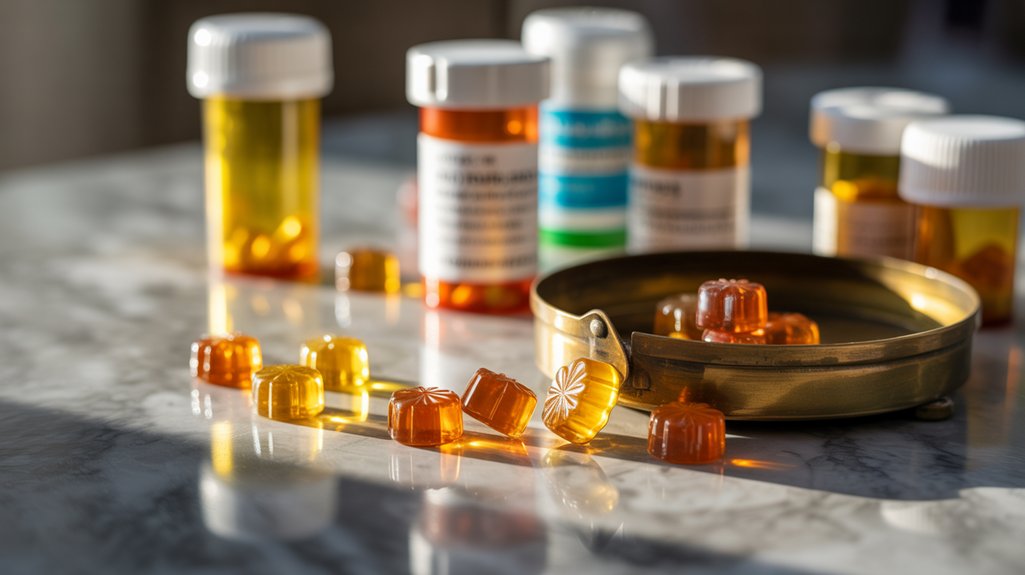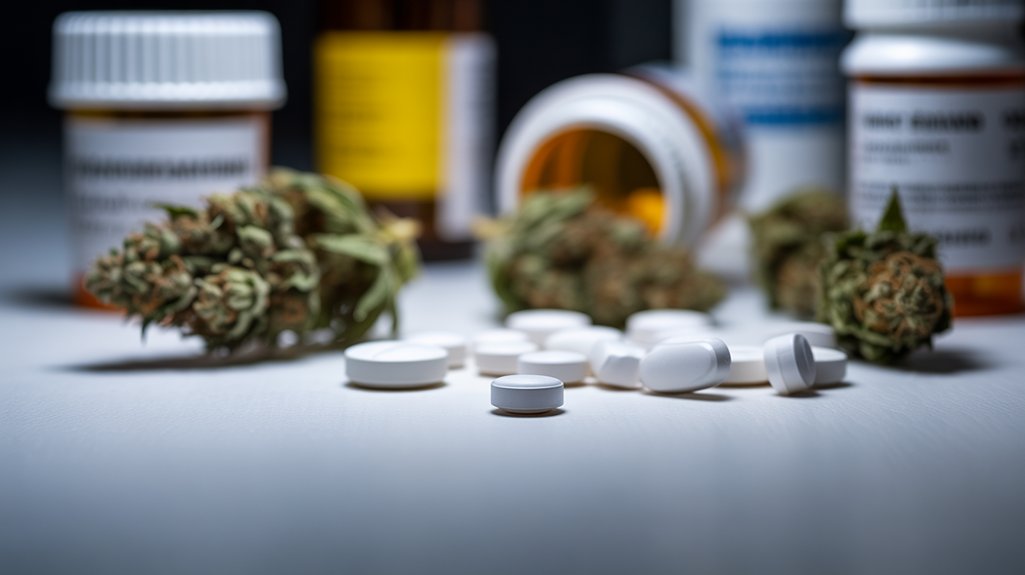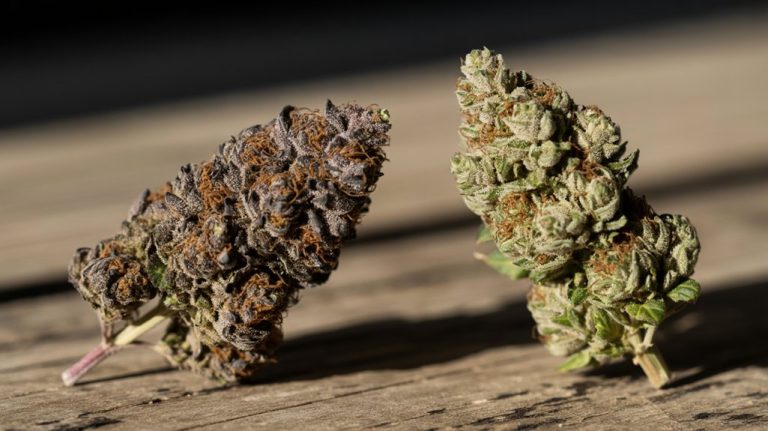Picture your liver as a busy highway where prescription medications and Delta-9 THC compete for the same processing lanes, potentially creating dangerous traffic jams in your system. You’re traversing uncharted territory when you combine these substances, as Delta-9 can dramatically alter how your body metabolizes critical medications like blood thinners, antidepressants, and seizure drugs. The consequences aren’t just theoretical—they’re happening in medicine cabinets across the country, and you need to understand exactly what’s at stake.
How Delta-9 THC Affects Your Body’s Drug Processing Systems

When you consume Delta-9 THC, it directly impacts the cytochrome P450 enzyme system in your liver—the same network responsible for metabolizing most prescription medications.
This interaction can alter how your body processes other drugs, potentially leading to unexpected effects.
Delta-9 THC specifically affects CYP3A4 and CYP2C9 liver enzymes, which handle numerous medications including blood thinners, antidepressants, and seizure medications.
When THC competes for these metabolic pathways, it can either slow down or speed up your medication’s breakdown, affecting drug concentrations in your bloodstream.
This metabolic interference means your prescription drugs might become less effective or more potent than intended.
The timing of consumption matters—effects on liver enzymes can persist for hours after THC use, creating prolonged interactions with your medications.
Blood Thinners and Cardiovascular Medications: Critical Interactions
Among prescription medications that pose serious interaction risks with Delta-9 THC, blood thinners and cardiovascular drugs require your heightened attention due to their narrow therapeutic windows.
Delta-9 can amplify warfarin’s anticoagulant effects, potentially increasing bleeding risks. This occurs because THC inhibits certain liver enzymes responsible for warfarin metabolism, causing the medication to remain active longer than intended.
Cardiovascular medications present additional concerns. Delta-9 commonly raises your heart rate and can cause fluctuations in blood pressure, potentially counteracting antihypertensive medications or exacerbating arrhythmias.
If you’re taking ACE inhibitors, beta-blockers, or calcium channel blockers, THC’s cardiovascular effects might interfere with your medication’s intended outcomes.
You should never combine Delta-9 with these medications without explicit medical supervision and careful monitoring of your therapeutic levels.
Antidepressants and Mental Health Medications: What You Need to Know
Delta-9 THC’s interaction with antidepressants and psychiatric medications creates complex pharmacological challenges that require careful consideration.
You’ll face potential complications when combining delta-9 with SSRIs, SNRIs, or tricyclic antidepressants, as THC can affect neurotransmitter systems including serotonin and dopamine pathways.
Your antidepressant efficacy may be compromised through THC’s influence on cytochrome P450 enzymes, which metabolize many psychiatric medications. This can alter drug concentrations in your bloodstream, potentially reducing therapeutic benefits or increasing side effects.
Mood stabilization becomes particularly concerning when you’re using lithium, anticonvulsants, or atypical antipsychotics alongside delta-9.
THC’s psychoactive properties may counteract stabilizing effects, potentially triggering mood episodes or exacerbating psychiatric symptoms. Always consult your prescribing physician before introducing delta-9 to your mental health treatment regimen.
Seizure Medications and Neurological Drug Combinations
Although neurological medications maintain delicate therapeutic windows, delta-9 THC can markedly disrupt seizure control and neurological drug effectiveness.
If you’re managing a seizure disorder, you’ll face significant risks when combining delta-9 with your neurological medications. THC can alter how your liver processes anticonvulsants, potentially reducing their protective effects against seizures.
Critical drug interactions you should understand include:
- Phenytoin and carbamazepine – Delta-9 can accelerate their metabolism, lowering blood levels.
- Valproic acid – THC may increase sedation and cognitive impairment.
- Levetiracetam – Combined use can worsen mood changes and irritability.
- Lamotrigine – Potential for enhanced dizziness and coordination problems.
You shouldn’t experiment with delta-9 without consulting your neurologist first, as breakthrough seizures pose serious health risks.
Pain Medications and Opioid Interaction Risks

Pain management presents another complex area where delta-9 THC interactions can compromise your safety and treatment effectiveness.
When you combine delta-9 with opioid medications like oxycodone, morphine, or fentanyl, you’re facing potentially dangerous synergistic effects. Both substances depress your central nervous system, creating amplified sedation, respiratory depression, and cognitive impairment risks.
Delta-9 can affect opioid metabolism through liver enzyme interactions, potentially altering how your body processes these medications. This interference may lead to unpredictable drug concentrations in your system.
While some patients report enhanced pain relief when combining these substances, you shouldn’t attempt this without medical supervision. The respiratory depression risk becomes particularly concerning, as both compounds can slow your breathing to dangerous levels.
Always consult your prescribing physician before introducing delta-9 to your pain management regimen.
Sedatives and Sleep Aids: Dangerous Amplification Effects
Beyond the domain of pain management, combining delta-9 THC with sedatives and sleep medications creates compounding risks that can prove life-threatening.
When you mix delta-9 with sedative compounds, both substances enhance each other’s depressant effects on your central nervous system. This dangerous amplification can severely compromise your respiratory function and cognitive abilities.
While delta-9 may initially improve sleep quality, combining it with sleep aids creates unpredictable interactions:
- Respiratory depression – Both substances slow breathing rates simultaneously
- Excessive sedation – Extended periods of unrousable sleep states
- Memory impairment – Severe cognitive dysfunction lasting hours
- Motor coordination loss – Increased fall and accident risks
You’re particularly vulnerable when using benzodiazepines, barbiturates, or prescription sleep medications alongside delta-9 THC.
Essential Steps Before Mixing Delta-9 With Any Prescription
How can you protect yourself from potentially dangerous drug interactions when considering delta-9 THC alongside your current medications?
First, consult your prescribing physician or pharmacist before starting any delta-9 products. Provide them with complete information about all medications, supplements, and health conditions you’re managing.
Request specific dosage guidelines that account for your current prescriptions and potential interactions.
Don’t rely on budtenders or online sources for medical advice. Healthcare professionals can assess your individual risk factors and monitor for adverse effects.
Make sure you receive proper informed consent about potential interactions, side effects, and warning signs to watch for.
Start with the lowest possible dose if cleared by your doctor, and maintain detailed records of timing, dosage, and any symptoms.
Never adjust prescription medications without medical supervision.
Conclusion
You can’t afford to gamble with your health when prescription medications meet delta-9 THC in your system’s enzymatic pathways. Just as two rivers converge unpredictably, these substances interact through your liver’s cytochrome P450 system, potentially altering drug concentrations dangerously. Before you’re caught in this biochemical crosscurrent, consult your healthcare provider. They’ll assess your specific medications, dosages, and health profile to determine if delta-9’s safe for you—because coincidental timing isn’t worth risking your life.





